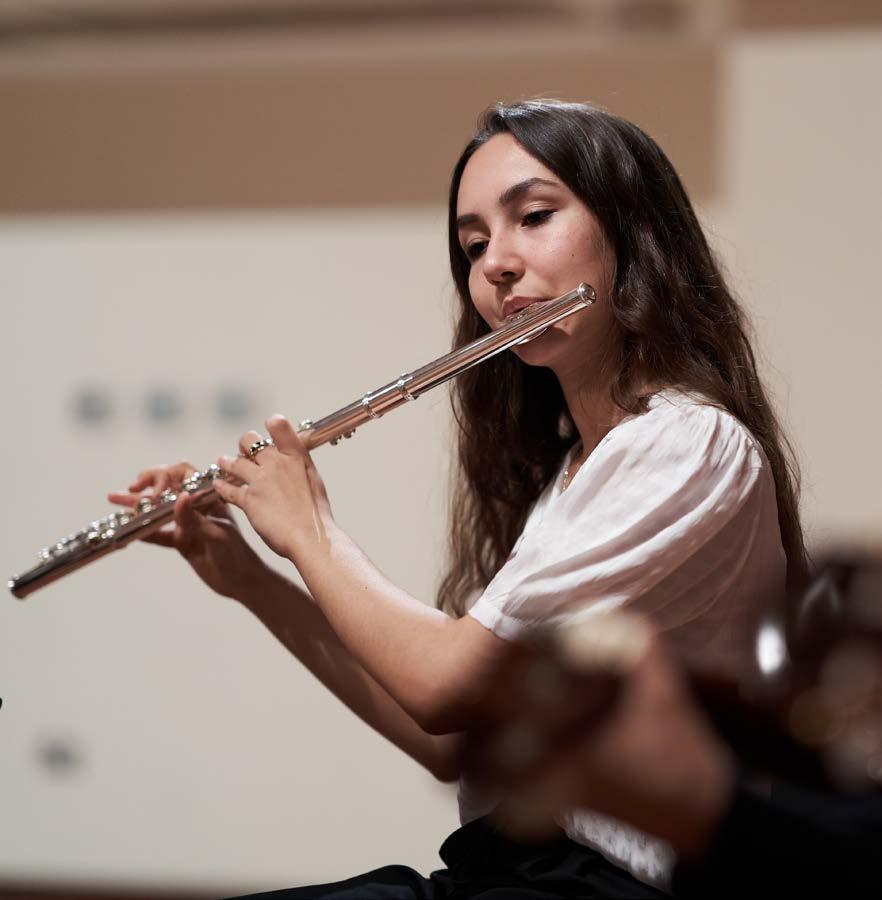
2 minute read
Music (A-Level
A
Le vels
Advertisement
Music
This course is demanding and rigorous for the more advanced musician, and offers students a broad and varied curriculum that focuses upon three core areas: performing, composing and listening/ appraising.
COURSE AIMS • Actively engage in the process of music study • Develop performing skills to demonstrate an understanding of musical elements, style, sense of continuity, interpretation and expression • Develop composing skills to demonstrate the manipulation of musical ideas and the use of musical devices and conventions • Recognise the interdependence of musical knowledge, understanding and skills, and make links between the integrated activities of performing, composing and appraising underpinned by attentive listening • Broaden musical experience and interests, develop imagination and foster creativity • Develop and extend the knowledge, understanding and skills needed to communicate effectively as musicians • Develop knowledge and understanding of a variety of instruments and styles, and of relevant approaches to both performing and composing • Develop awareness of music technologies and their use in the creation and presentation of music
111 A-Level
• Appraise contrasting genres, styles and traditions of music, and develop understanding of musical contexts and a coherent awareness of musical chronology • Develop as effective, independent learners and as critical and reflective thinkers with enquiring minds
• Reflect critically and make personal judgements on their own and others’ music • Engage with, and extend appreciation of, the diverse heritage of music in order to promote personal, social, intellectual and cultural development
ADVICE Students must have an interest in performing, creating and listening to a variety of styles of music. Students should have experience performing in concerts or in front of an audience and should be able to read music. They are expected to be able to perform confidently and at a high level on an instrument or voice. Students should be able to compose and notate their ideas using software.
In the words of Albert Einstein: “The greatest scientists are artists as well”. Music will help you to build your problem solving, research, planning, analytical and critical thinking skills. In addition, it will help to develop your creativity, discipline, composure under pressure, time management, communication, team and individual working ability - all gained from practice and performing. You will also learn technical skills through using computers, equipment and software to create and record music. 113 A-Level
ENTRY CRITERIA We expect prospective students to be competent performers and to have a good understanding of music theory. It is desirable for students to have a minimum of Grade 6 ABRSM or Trinity grades on their chosen instrument or voice, and Grade 6 in GCSE Music.
We expect all of our A-Level musicians to be part of the Senior Choir, and to be involved in the regular concerts and events in the Music Department.
ASSESSMENT CRITERIA
PERFORMING (30%) Externally assessed with a total of 60 marks.
COMPOSING (30%) Externally assessed with a total of 60 marks.
APPRAISING EXAM (40%) One written paper of 2 hours 10 minutes with a total of 100 marks.
A-LEVEL MUSIC
CAREER OPPORTUNITIES

Performer, Composer, Conductor, Sound Engineer, Music Producer, Events Manager, Music Therapist, and careers in Digital Marketing, Social Media Management, PR, Technology, Merchandising.





